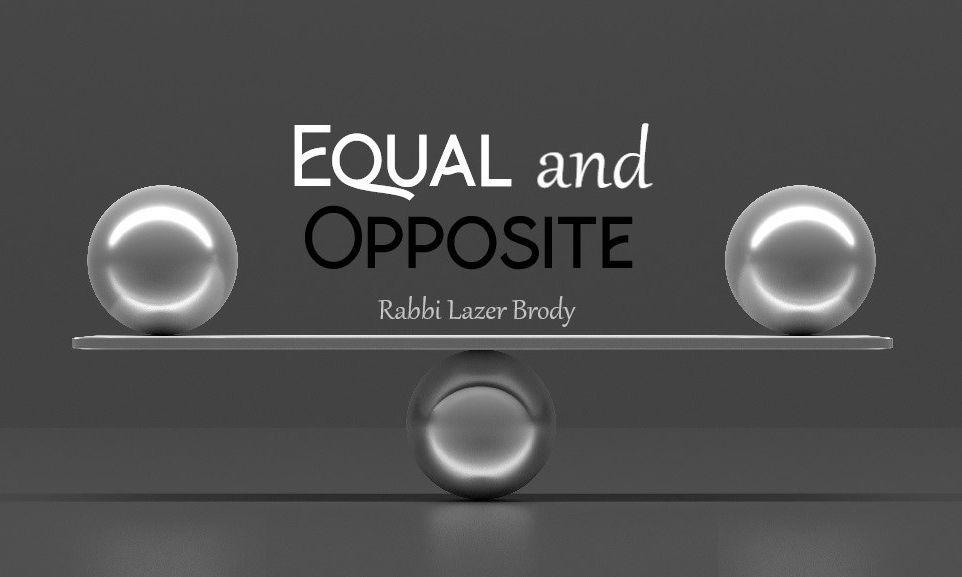
Equal and Opposite
The stronger the recoil, the greater the forward thrust. The lower the descent, the greater the ascent. This is the greatest encouragement we have during Tisha B'Av.

Did you ever wonder why a champion Major League baseball pitcher must take such a big windup before he throws a 100-MPH fastball? Did you ever stop and think why no one is allowed to stand behind a jet airplane when it’s taking off? Did you ever ponder why you can’t build muscle unless you lift heavy weights or exert yourself in some other strenuous exercise?
The answer to all the above questions, and many more in life, is the same: Sir Isaac Newton’s Third Law of Physics: “Every action has an equal and opposite reaction.” This is the underlying principle of jet propulsion, artillery, rockets, and anything that entails forward thrust. The more we inflate a balloon, then release it without tying it, the more it will fly all over the place. The more we draw back on the bowstring, the further and faster the arrow flies.
I would have loved to speak to Sir Isaac; with such cogent powers of physical observation, he could have been  a spiritual giant as well. Both the Rambam and the Gaon of Vilna were fantastic physicists, for their familiarity with the spiritual realm helped them understand the underlying secrets of creation.
a spiritual giant as well. Both the Rambam and the Gaon of Vilna were fantastic physicists, for their familiarity with the spiritual realm helped them understand the underlying secrets of creation.
By observing the laws of the physical world, we can understand the laws of the spiritual world.
This week, we encounter the most catastrophic day in our people’s history – Tisha B’Av, the day of repeated calamity and destruction. But a few short days later, we reach “Love Day” – the 15th of Av or “Tu B’Av”, one of the happiest days in the Jewish calendar.
Where do we get the emotional strength to pick ourselves up from fasting and lamentations to singing and dancing in the vineyards?
Newton’s Law is the answer – “every action has an equal and opposite reaction.” Our sages tell us the same thing: Hashem runs the world “measure for measure” (tractate Sanhedrin, 90a). Every action elicits an equal and opposite reaction. A clear example of this is what our sages tell us applies to Tisha B’Av (tractate Taanit, 30b), “Anyone who mourns [the destruction of our Holy Temple in] Jerusalem, will merit seeing its joy [of being rebuilt].”
Newton’s Law jives perfectly with the principles of emuna, particularly, that everything Hashem does is for our ultimate benefit. As in the gym or out on the track, we know that pain makes gain. Again, the same holds for the spiritual. Hashem puts us in difficult challenges to elicit an equal and opposite reaction of prayer, self-assessment and teshuva. If our lives were hunky-dory, we’d never make any sincere effort to get close to Hashem.
It’s the Tisha B’Av that brings us to the Tu B’Av. The stronger the recoil, the greater the forward thrust. The lower the descent, the greater the subsequent ascent. This is probably the greatest encouragement we have. Our setbacks are temporary. If we look at them with emuna, then they will all turn into major triumphs, for they’ll bring us closer to Hashem – the ultimate success in this world, an achievement that cannot be accomplished in the World to Come. That’s what we’re doing down here.
Life is not about having a good time, even though serving Hashem is a sublime pleasure. We’re here to uplift ourselves and to uplift this lowly material universe with the tools of Torah, emuna and prayer that Hashem gives us. This coming Shabbat – the Shabbat after Tisha B’Av – is known as Shabbat Nachamu, the Sabbath of Consolation. Hashem consoles us and conveys to us that our suffering was not in vain; the degree of our tribulations in Diaspora – with all the pogroms, inquisitions and holocausts – only shows us what’s in store for us with Mashiach, the ingathering of the exiles, redemption, and the rebuilding of our Holy Temple, speedily and in our days, amen.
We can now understand how Rebbe Nachman, who was fully familiar with both the physical and metaphysical secrets of creation, can tell us – even when we’re down – there is no such thing as despair! Don’t delve on the recoil – wait for the forward thrust.
Now we know why our Rebbe’s name is “Nachman” – in Hebrew, it means “one who consoles”. We, the Jewish people, might be down now, but we’re about to make a meteoric rise. Stay onboard for the ride, because it will be exciting.










Tell us what you think!
Thank you for your comment!
It will be published after approval by the Editor.